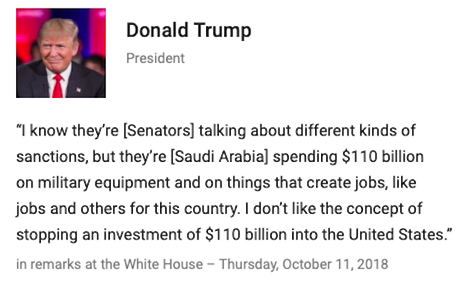
Saudi Arabia is probably the least democratic country in the world. It is an absolute monarchy. That should have been enough to keep the United States from selling weapons to them. Unfortunately, the U.S. has decided that buying Saudi oil is more important than spreading democracy.
But now the government of Saudi Arabia has intentionally killed a journalist who they did not like. That journalist, Jamal Khashoggi, was a Saudi citizen living in the United States and working for a U.S. news organization (
The Washington Post). There is no doubt that this government murder happened. Turkey has video and audio tapes that the murder happened, and it happened in the Saudi Arabian embassy.
But Donald Trump is trying to avoid punishing Saudi Arabia for this. That's because the two things he respects most are money and power, and the Saudi leaders have plenty of both. And one of the things he least respects is journalists telling the truth.
Trump is trying to disguise his protection of the Saudi murderers as protecting American jobs. That's both immoral and ludicrous! He has claimed that the Saudi's are buying $110 billion in arms from the United States. That is simply a BIG FAT LIE!
Here is
the truth from Glenn Kessler in
The Washington Post:
President Trump pushed back against sanctioning Saudi Arabia over the disappearance and likely killing of Washington Post contributor Jamal Khashoggi, saying the Saudis have pledged to buy $110 billion of military equipment from the United States.
But this number is fanciful and unlikely to come to fruition – and in any case many of the purported deals are long in the future, according to a detailed list obtained by The Fact Checker. Indeed, in a March meeting with the country’s de facto ruler, Crown Prince Mohammad bin Salman, Trump noted that the current set of planned deliveries was “peanuts.”
Let’s explore.
The Facts
When Trump completed his visit May, 2017 trip to Saudi Arabia, claiming $270 billion in sales, we gave him Three Pinocchios after a review of the data. The $110 billion in military sales aroused great skepticism among experts, with Bruce Riedel of the Brookings Institution calling the claim “fake news.”
Most of the publicly announced items had been previously announced by the Obama administration and there appeared to be few, if any, signed contracts. Rather, many of the announcements were MOIs — memorandums of intent. There were six specific items, adding up to $28 billion, but all had been previously notified to Congress by the Obama administration.
After Trump’s remarks on Khashoggi, Reidel said the $110 billion figure was “still fake.”
He said the Saudis have not bought locked in the arms deals touted by Trump, even a $15 billion deal for Terminal High Altitude Area Defense anti-ballistic missile system that has received preliminary approval from Congress. He noted that the Saudis let a September deadline for the deal lapse with Lockheed Martin, despite a 20 percent price cut.
A review of the announcements on the Defense Security Cooperation Agency website since Trump’s 2017 trip reveals that, besides THAAD, there have been six State Department announcements of approval of Saudi sales, totaling just $4 billion.
According to the confidential 2017 document of all of the military-sales agreements reviewed by The Fact Checker, most of the items did not have delivery dates or were scheduled for 2022 or beyond. The THAAD, for instance, was scheduled for 2023-2026. An order for four ships would not be completed until 2028. Billions of dollars in bombs are scheduled for delivery in 2022.
In essence, this is a wish list. It’s worth recalling that Obama offered Saudi Arabia $115 billion in deals, about half of which resulted in actual sales.
Trump raised the possibility that the Saudis might turn to Russia or China for its hardware. The Saudis are still considering purchasing a Russian S-400 air-defense system, but Reidel said the kingdom is too invested in U.S. equipment – which means the U.S. has significant leverage if it wanted to punish the Saudis over the Khashoggi matter.
“It would take decades to transition from U.S. and U.K. aircraft, for example, to Russian or Chinese aircraft,” Reidel said. “Same is true for tanks, communications equipment and other hi-tech equipment. And the Saudis don’t have time given they are bogged down in Yemen.”


